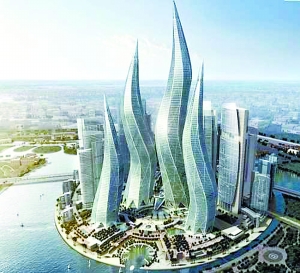Dubai, myth shattered? The rich are strapped for cash, selling houses and throwing in a Bentley for free (photo gallery)
On the streets of Dubai, an abandoned BMW is covered with a thick layer of sandy soil.
The planning drawing of the Candle in the Wind Tower, the entire shape looks like a moving and jumping candle flame. These towers may remain just on paper.
Dubai is the second largest city in the United Arab Emirates. Some people say it is built with money. In the 1950s, it was still a simple seaside town in the Arabian Gulf. In 1966, oil was discovered in the Middle East, and Dubai became rich overnight. A metropolis was built in the blink of an eye. Skyscrapers rose miraculously along the Hor River. Dubai was ambitious to make a big move in the new century. It opened its doors and vigorously developed tourism. Millions of gallons of desalinated seawater have irrigated all-year-round green golf courses, changing the face of the place. By the 1990s, Dubai had built landmark buildings such as the sailboat hotel. While becoming a shipping and air freight center, Dubai also began to invest in new technologies, using special Internet and media "cities" to turn Dubai into a communication center. From 1995 to 2000 in just 6 years, Dubai's population grew by 25%. Most of these people are foreigners who work at all levels of Dubai society, from servants to senior management. In 2007, the total number of official residents in the UAE was only 864,000, while there were 3.6 million foreigners.
However, Dubai does not have its own oil fields, and its economy is based on real estate, finance, and tourism. Therefore, Dubai does not have a relatively stable economic foundation. Faced with the impact of the financial crisis, is the myth of Dubai about to burst?
- The "get-rich-quick game" of real estate speculation
For at least the past ten years, real estate speculation has been the most popular "sport" in Dubai. Even in the first quarter of last year, the prices of houses and apartments increased by 43%, and many of them are pre-sale properties that have not yet been built. Mortgage funds are easy to obtain, and investors can often make huge profits in a few weeks or even days, and they haven't even started paying monthly installments. Everyone wants to participate in this game. "Employees no longer focus on their work," complained the president of a regional freight company, "they're all thinking about putting down a 10% deposit to buy a house."
